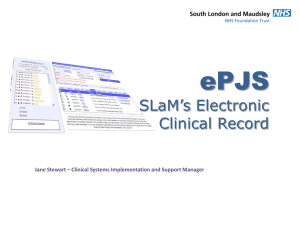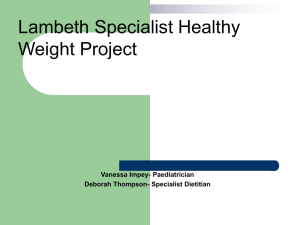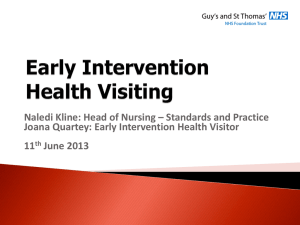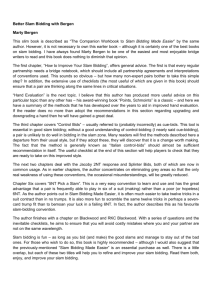processes and outcomes of care for patients with severe mental
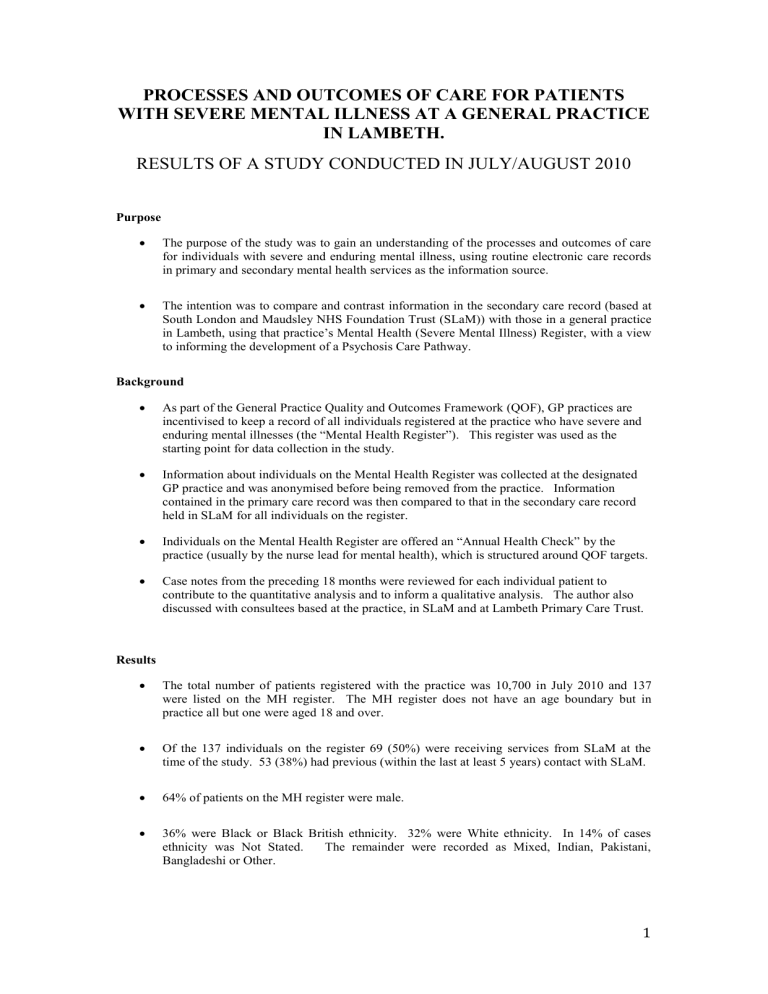
PROCESSES AND OUTCOMES OF CARE FOR PATIENTS
WITH SEVERE MENTAL ILLNESS AT A GENERAL PRACTICE
IN LAMBETH.
RESULTS OF A STUDY CONDUCTED IN JULY/AUGUST 2010
Purpose
The purpose of the study was to gain an understanding of the processes and outcomes of care for individuals with severe and enduring mental illness, using routine electronic care records in primary and secondary mental health services as the information source.
The intention was to compare and contrast information in the secondary care record (based at
South London and Maudsley NHS Foundation Trust (SLaM)) with those in a general practice in Lambeth, using that practice’s Mental Health (Severe Mental Illness) Register, with a view to informing the development of a Psychosis Care Pathway.
Background
As part of the General Practice Quality and Outcomes Framework (QOF), GP practices are incentivised to keep a record of all individuals registered at the practice who have severe and enduring mental illnesses (the “Mental Health Register”). This register was used as the starting point for data collection in the study.
Information about individuals on the Mental Health Register was collected at the designated
GP practice and was anonymised before being removed from the practice. Information contained in the primary care record was then compared to that in the secondary care record held in SLaM for all individuals on the register.
Individuals on the Mental Health Register are offered an “Annual Health Check” by the practice (usually by the nurse lead for mental health), which is structured around QOF targets.
Case notes from the preceding 18 months were reviewed for each individual patient to contribute to the quantitative analysis and to inform a qualitative analysis. The author also discussed with consultees based at the practice, in SLaM and at Lambeth Primary Care Trust.
Results
The total number of patients registered with the practice was 10,700 in July 2010 and 137 were listed on the MH register. The MH register does not have an age boundary but in practice all but one were aged 18 and over.
Of the 137 individuals on the register 69 (50%) were receiving services from SLaM at the time of the study. 53 (38%) had previous (within the last at least 5 years) contact with SLaM.
64% of patients on the MH register were male.
36% were Black or Black British ethnicity. 32% were White ethnicity. In 14% of cases ethnicity was Not Stated. The remainder were recorded as Mixed, Indian, Pakistani,
Bangladeshi or Other.
1
The average age of patients on the SMI register was 47 years (range 16-79). Patients actively receiving services from SLaM at the time of the study tended to be younger.
The majority of patients on the register had diagnoses of schizophrenia, bipolar affective disorder or other psychoses. 9 patients had a primary diagnosis of depression (non-psychotic) and fewer than 10 had other diagnoses such as personality disorder or learning disability.
Characteristics of patients on the register range from those who are in full recovery with few if any physical, psychological or social care needs, to those with a higher level of clinical complexity and need.
The average number of face to face contacts between patients on the register and clinicians at the practice between January 2009 and July 2010 was 10 contacts (range 0-71 contacts).
A small number of patients had no contact with the practice or SLaM in the 18 month period covered by the study.
Comparison of Primary and Secondary Care Records
Overall there appeared to be a high level of agreement between the data held in primary and secondary care. The primary care record also usually contained scanned correspondence from secondary care (usually SLaM).
In primary care, QOF is a key driver for what information is collected and this resulted in greater emphasis on physical health monitoring. Consistent with national data, patients on the register had higher rates of diabetes, hypercholesterolemia and smoking compared to the practice average.
Alcohol use and smoking was assessed routinely in primary care (driven by QOF targets), but substance misuse co-morbidity was not routinely recorded.
In the secondary care record there was greater emphasis on psychological needs, detailed assessment of social care needs, and risk assessment (suicide, violence, child safeguarding, neglect etc.).
In mental health generally there shift in emphasis away from “monitoring” of problem symptoms and diagnoses, towards social inclusion and recovery and this was evident in aspects of the secondary care record, but not the primary care record.
In secondary care the Health of the Nation Outcomes Scales (HoNOS) indicator was a commonly used outcome. This is not used in primary care.
Content of the Annual Health Check
The following were collected routinely at the annual health check: o Blood pressure, pulse, Body Mass Index o
Blood tests including lipids, glucose and Lithium level, renal function, and thyroid function for patients prescribed Lithium. o Cervical screening, contraceptive advice o Smoking and smoking cessation o
Alcohol assessment and referral to alcohol services o Brief social history such as employment status, accommodation o Name of a significant carer or family member
2
In addition to assessment at the formal QOF review, other therapeutic activity by the practice nurse or GPs included: Psychotropic medication management (dose adjustment, stopping and/or changing medication); referral to/liaison with secondary mental health care services; administration of depot medication; referral/signposting to other agencies (including voluntary sector); support with state benefits applications and Driving License applications; initiating
Mental Health Act assessments (but not usually attending assessments); general counseling and support; referral for psychological therapy.
Conclusions and Recommendations
With increasing numbers of patients being managed in primary care, it is recommended that the Mental Health Register and Annual Health Check is expanded to include more detailed evaluation of psychological wellbeing and mental state, more detailed assessment of medication including adherence and side effects, and review of risk. This could contribute to relapse prevention and longer term wellbeing of mental health service users.
Although the MH Register was originally defined as a register for people with severe psychotic and bipolar illnesses, it may be more appropriate to define such a register in terms of level of need rather than diagnosis.
From a clinician’s perspective, the concept of a lifelong MH Register is attractive because risks such as suicide risk and cardiovascular risk persist for decades after recovery from a first psychotic episode. This would seem especially important if care is delivered by an increasingly diverse range of statutory and non-statutory agencies i.e. primary care have an over-view of the individual’s care plan and can “keep track” of individuals who have disengaged from services.
However, the idea of being on such a register may not be acceptable to all service users and this would need further exploration.
In a model in which it is envisaged that patients move between primary and secondary care, good communication is essential to ensure seamless transfer of care (to minimise risk and to ensure the least disruptive patient experience).
Links between secondary care and primary care could be strengthened so that primary care clinicians can access expert advice easily and quickly (without the patient having to be referred back to secondary care) and so that patients can benefit from new research developments in relation to the long term management of their condition (rather than just at times of crisis).
There is a group of patients who develop progressively negative symptoms of schizophrenia such as reduced motivation and social withdrawal. Such patients may be less likely to come to the attention of services compared to those with behavioural disturbance associated with positive psychosis, but may have chronic elevated levels of need and risk (e.g. of neglect) and represent a particularly vulnerable group. The MH Register may be a mechanism whereby the needs of such patients can be monitored in the longer term.
Further research could look at the views of service users and carers about the MH Register.
Do individuals find it helpful to remain on such a register indefinitely? What should be the process for individuals ceasing to be on the register?
3
Authors
Dr Emily Daley Locum Consultant Psychiatrist, South London and Maudsley NHS Foundation Trust;
Dr Sarah Corlett, Consultant in Public Health, NHS Lambeth; Dr Rosalind Ramsay, Associate Clinical
Director Psychosis Clinical Academic Group, South London and Maudsley NHS Foundation Trust;
Raviendrakumar Kunasingham, Public Health Information Officer, NHS Lambeth (data analysis).
Consultees
General Practice: Dr Richard Williams (former partner); Dr Bruce Blackwell (partner); Catrina
Cattigan (Practice lead nurse for Mental Health).
South London and Maudsley NHS Foundation Trust : Natalie Warman, SLaM lead for Physical
Health Care; Kevin Smith, SLaM Clinical Outcomes Group; Claire Squires, Gateway worker,
Lambeth.
NHS Lambeth: Jean Spencer, Commissioning Manager
4
